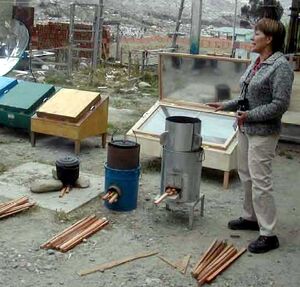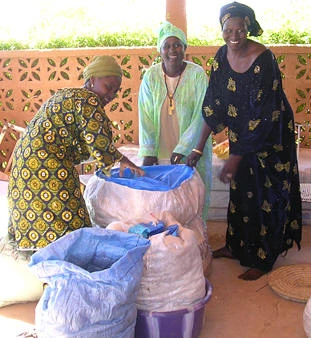
Ruth Whitfield demonstrates solar cookers and Rocket stoves in Bolivia
David Whitfield is the director of the CEDESOL Foundation, which focuses on alternative education, renewable energy, and social equality, working primarily in Bolivia. David is also the chairman of the steering committee for the new international association of solar cookers, which took life in Granada, Spain in July of 2006.
David is U. S. citizen who has lived in Bolivia for a number of years. He is a small entrepreneur who speaks very fluent Spanish in the Bolivian idiom. He is remarkable for his dynamism and his strong social and ecological conscience.
Ruth Whitfield, is the owner and manager of Sobre la Roca: Energias Alternativas, a Bolvian small business dedicated to social enterprise through manufacturing and dissemination of ecological cookers (solar, retained heat and efficient biomass stoves)
David and his Bolivian wife Ruth have undertaken a private crusade on a shoestring to introduce solar ovens and other alternative energy appliances to people across Bolivia. Because of widespread poverty and the increasing scarcity and expense of traditional fuels, his efforts have been well received wherever he goes.
Since 1998, David has honed the method of presenting alternative technologies in the cities as well as in the countryside.
News and recent developments
- November 2007: At the 2006 International Solar Cookers Conference in Spain, Wietske Jongbloed of the KoZon Foundation learned a useful trick from David and Ruth Whitfield: a heat-retention cooker can be made from empty rice bags. The Whitfields advised that two large rice bags, with insulation such as wool or cotton in between, make a sack that will keep a pot of food at cooking temperatures long after it is removed from a heat source. KoZon introduced the idea in Tahoua, Niger, where cooking pots are typically very large — 12 to 16 liters. For these pots, four rice bags are needed to surround the pot, and a fifth bag stuffed with insulation covers the top. Of this five-bag system, Jongbloed says, “It is named ‘Idadafoua’ and works marvelously.” Jongbloed writes that women in the Sahel cook meals for families of 10 to 12 or more people. The KoZon project in Tahoua teaches the use of three cooking devices — fuel-efficient wood stoves, heat-retention cookers, and solar CooKits. CooKits are used on sunny days for meat or fish sauces, eggs, sweet potatoes, and groundnuts, and for cakes that are sold by the slice to earn money.
- April 2006: Under the auspices of the French NGO Bolivia Inti, alternative energy experts David Whitfield and Ruth Whitfield introduced solar cooking to many villages in Bolivia between 2001 and 2003. After demonstrating solar cookers in public forums, they then trained those people expressing interest in how to make and use solar cookers. Research was conducted in the central highlands of Bolivia in 2005 to assess the continuing impacts of solar cooking on participants of these solar cooking courses conducted by the Whitfields. The researcher, Chris Pell of the University College London, interviewed 170 people with and without solar cookers to determine whether their use affected household fuel consumption. The data showed that 92.7% of the solar cooking course participants continue to use their solar cooker three to five years after the course ended. In fact, 62.4% of all participants use their solar cooker at least once a day during the dry season, demonstrating a lifestyle change that incorporates solar cooking into their daily lives. The solar cooker now supplements their other energy sources: gas, wood, or a combination of gas and wood.[1]
Audio and video
- January 2008: Audio recording of David Whitfield's presentation at the ETHOS Conference in Kirkland, Washington
- November 2002: Audio interview with David and Ruth Whitfield
See also
- CEDESOL Foundation
- Sobre la Roca
- Integrated Cooking Method
External Links
Contact
Mr. David Whitfield
Executive Director
CEDESOL Foundation (Center for Development with Solar energy)
P.O. 738
Cochabamba
Bolivia
Phone/Fax: +591 4 4488187
Mobile: +591 7 742 4269
skype ID: solar1bol

